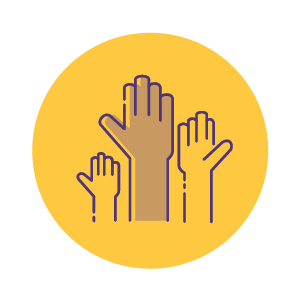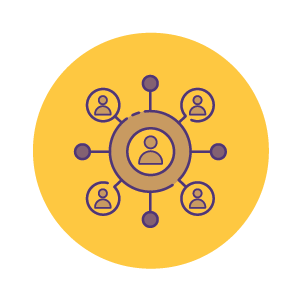Organizations of all types are increasingly looking to hire professionals who can design, use, and manage digital tools, which makes it pretty easy to see the appeal of choosing to study technology. But now that you're starting to think more seriously about pursuing a degree, you're left choosing between two fields: data science versus computer science.
How can you determine the right path to follow? Learning more about both fields can help you gain a better sense of which one might be the right fit.
Start your research right now — you'll be one step closer to earning a degree that can help advance your technology career.
Data science vs. computer science: Distinguishing between similar fields
Computer science involves leveraging devices and computational processes to create useful programs and systems. It focuses on theory and all the fundamental elements that go into the design of computer systems and user interfaces. Professionals in this field help ensure that people are able to effectively use computers and applications to solve problems.
As for data science, it's a much newer field that integrates a variety of disciplines like computer science, programming, business analytics, and statistics. It really began to emerge as organizations found themselves collecting ever-increasing amounts of data that needed to be transformed into actionable insights. Today, data science professionals are seen as essential across nearly every industry.
Comparing a few relevant degree programs
Data science and computer science are both available as distinct degree programs. But it's also worth exploring computer information systems offerings, which provide students with a broad knowledge base that's incredibly useful for a range of careers.
There's overlap among these fields, so some courses are common to each of these programs. Students pursuing one of these areas of study at the undergraduate level can expect to learn about programming, statistics, algorithms and data structures, and computer systems.

Common undergraduate courses for these degrees.
Data Science, Computer Information Systems, and Computer Science |
| Statistics |
Algorithms and Data Structures |
| Programming |
Computer Systems |
Despite the similarities, there are some key differences. Computer science focuses more on the inner workings of a computer through courses in computer architecture and engineering while data science begins to introduce coursework in data analysis, visualizations, and predictive analytics. And computer information systems is more about teaching students how to solve business problems through coursework in topics like information security and database management. Some undergraduate computer information systems programs, such as the one at Bellevue University, also allow students to choose an emphasis such as application development or business intelligence.
Note that there's more variation for graduate-level coursework. Computer science master's and doctoral programs often allow students to pursue a particular concentration. Some common computer science specializations include software engineering, computer and information science, and human-computer integration. Those who pursue an advanced degree in computer information systems can also customize their education through concentrations in databases, software development, or cybersecurity. Specializations are less common for data science graduate programs given the interdisciplinary nature of the field, but curriculums tend to vary quite a bit from one program to the next.
It's also worth mentioning that you can complete an online data science degree, online computer information systems degree, or online computer science degree if you wish. These virtual offerings can be helpful for those who are juggling work and other responsibilities.
Data science vs. computer science: Contrasting skill sets
There's no denying the importance of technical competencies in these fields. Both data science and computer science professionals need experience using a variety of tools and a willingness to think critically as they solve problems their organizations are facing.
So which hard skills are most important? Using Labor Insight, a real-time labor market analysis tool from Burning Glass Technologies, to evaluate computer science and data science job postings from the last year reveals that Python, SQL, and machine learning skills are essential for professionals in both fields.*
The same analysis also highlights a number of differences. In data science, for example, data analysis, artificial intelligence, and big data are ranked highly. And computer science professionals are expected to be experienced with software development, information systems, and Linux.

A look at the top skills employers are seeking.
|
|
| SQL |
| Python |
| Project management |
| Machine Learning |
| Data Analysis |
Big data |
| Data Analysis |
Software engineering |
| Artificial intelligence |
Information Systems |
| Tableau |
JavaScript |
| Predictive models |
Linux |
1. Burning-Glass.com (analysis of 188,862 job postings that mention data science, May 1, 2020 - April 30, 2021)
2. Burning-Glass.com (analysis of 1,094,741 job postings that mention computer science, May 1, 2020 - April 30, 2021)
While technical capabilities are critical for excelling in both of these fields, you might be surprised to know how valuable soft skills are. In fact, a survey from a business and technology consultancy reveals that organizations value technology candidates with a number of soft skills:
-
Verbal communication
-
Teamwork
-
Written communication
-
Leadership
Data science vs. computer science: Analyzing differences in roles
The actual work activities computer science and data science professionals do is probably the clearest way to differentiate the two. While there are a variety of roles that fall under computer science as well as data science, many on-the-job responsibilities overlap within the fields.

Comparing common job duties.
|
|
| Asking and answering questions |
Fixing bugs |
| Cleaning and analyzing datasets |
Developing and deploying software |
| Building visualizations |
Running tests on new systems |
| Making actionable recommendations |
Creating written documentation |
The work data science professionals do is centered on making sense of vast amounts of information. Their responsibilities include cleaning and analyzing datasets, building visualizations to communicate to different audiences, and making recommendations based on their insights. More than anything, data science professionals are responsible for asking questions and uncovering answers.
When it comes to computer science, duties typically include debugging, developing and deploying software as well as testing new systems. Computer science professionals also collaborate with a variety of other team members and need to be comfortable crafting technical documentation.
Continue building your technology career
There isn't a right answer when it comes to choosing between data science versus computer science. Both are fascinating career paths. Thinking about which field fits best with your professional goals can help you make a decision.
Does data science seem like your calling? Find out how to get started in the field by visiting the Bellevue University Bachelor of Science in Data Science program page. If you already have a bachelor's degree, take a look at the Master of Science in Data Science.
Or perhaps you're interested in combining the theoretical knowledge of computer science with applicable learning you can use to solve real-world problems. Visit the Bellevue University Bachelor of Science in Computer Information Systems program page or the Master of Science in Computer Information Systems program page to learn more about furthering your career aspirations.
*Burning-Glass.com (188,862 job postings that mention data science and 1,094,741 job postings that mention computer science, May 1, 2020 – April 30, 2021)